- Bad Doberan
-
Bad Doberan Bad Doberaner Monastery 
Coordinates 54°06′25″N 11°54′19″E / 54.10694°N 11.90528°ECoordinates: 54°06′25″N 11°54′19″E / 54.10694°N 11.90528°E Administration Country Germany State Mecklenburg-Vorpommern District Rostock Mayor Hartmut Polzin (SPD) Basic statistics Area 32.74 km2 (12.64 sq mi) Elevation 15 m (49 ft) Population 11,325 (31 December 2010)[1] - Density 346 /km2 (896 /sq mi) Other information Time zone CET/CEST (UTC+1/+2) Licence plate DBR Postal code 18209 Area code 038203 Website Official website Bad Doberan (German pronunciation: [baːt dobəˈʁaːn]) is a town in the district of Rostock, Mecklenburg-Vorpommern, Germany. It was the capital of the former district of Bad Doberan. As of 2010 its population was 11,325.
Contents
Geography
Bad Doberan is situated just 15 kilometres (9.3 mi) west of Rostock's city centre and is therefore part of one of the most developed regions in the north-eastern part of Germany. The town nestles between beautiful beech tree forests just 6 km from the Baltic Sea and is one of the earliest German settlements in Mecklenburg. Today the town is a very popular bathing resort, thanks to Heiligendamm, a district of Bad Doberan situated directly at the cliff line of the Baltic. Historically, Doberan used to be the summer residence for the Mecklenburg Dukes who resided in Schwerin, and for their entourage.
History
The area's first settlers were Cistercian monks, who founded a monastery here, Doberan Abbey, in 1171. Doberan (its original name) remained a small village until 1793, when the duke of Mecklenburg founded the first German bathing resort, Heiligendamm. Doberan and Heiligendamm have been connected by a narrow gauge railway the Mollibahn since 1886. The town has been called Bad Doberan since 1921 ("Bad" means "spa" and is a common prefix in Germany).
In August 1932, Adolf Hitler was granted an honorary citizenship; Bad Doberan was the first town in Germany to do so. In fact, as the certificate was lost, there was disagreement for several years as to whether he had been granted honorary citizenship or not. However, in Spring 1932 the Nazi Party had an absolute majority in the town council assembly, and published articles still exist from that time, so it was generally accepted that Hitler was really honoured in this way. With the town hosting the G8 summit in June 2007, it was decided on April 2 that Hitler should be removed from the town's roll of honour, although normally an honorary citizenship of this kind ends upon the death of the person involved.[2]
On June 12, 2011, a document surfaced that most likely points to Rosenkopf as the first German town to grant Adolf Hitler honorary citizenship (July 22, 1932), not Bad Doberan.
Sights
The classicist buildings characterizing the centres of Bad Doberan and Heiligendamm were all constructed between 1801 and 1836 by the architect Carl Theodor Severin.
However, the most famous building in Bad Doberan is the cathedral, or rather minster (Doberaner Münster, 1368), which was once the church of Doberan Abbey, and is one of the most impressive examples of North German brick architecture.
Bad Doberan is also home to the "Molli", a historic 19th century steam engine that acts as a tourist attraction/shuttle for everyday use, in the town and to the nearby beach village.
The town plays host to an annual festival celebrating the music of Frank Zappa, the Zappanale, and also displays a bust of the artist's head.
Partnerships
References
- ^ "Bevölkerungsentwicklung der Kreise und Gemeinden" (in German). Statistisches Amt Mecklenburg-Vorpommern. 31 December 2010. http://service.mvnet.de/statmv/daten_stam_berichte/e-bibointerth01/bevoelkerung--haushalte--familien--flaeche/a-i__/a123__/2010/daten/a123-2010-22.pdf.
- ^ Town embarrassed by Hitler link. 02/04/2007. ABC News Online
External links
- (German) Bad Doberan official website
- (German) Doberan Newspaper on Sunday
Categories:- Towns in Mecklenburg-Vorpommern
- Spa towns in Germany
Wikimedia Foundation. 2010.



